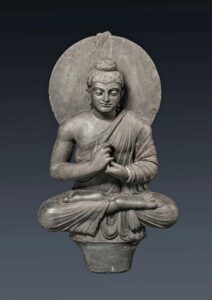Gil Fronsdale on “The Storms of Spiritual Life”
A reflection on practice by Other Teachers & Folks We Value
 Through effort, attention,
Through effort, attention,
Restraint and self-control,
The wise person can become an island
No flood will overwhelm.- Dhammapada 25
Expecting Buddhist practice to entail only joy & ease is naive. More realistic is to expect both joy & sorrow, ease & struggle. If the practice is to engage with our full life, then inevitably we will practice in times of crisis, loss, or painful self- confrontation. Certainly it would be nice to negotiate these times with calm, grace & wisdom. However, if we are hard on ourselves for not doing so, we only add to our suffering & hinder the growth of compassion….
I have known meditators who have congratulated themselves for their meditative proficiency when practice has been easy. And I have known meditators filled with doubt & self-condemnation when the practice has been stormy. Practicing with our best effort during periods of crisis & personal struggle may not bring about spiritual highs. It may, however, bring something more important: a strengthening of the inner qualities that sustain a spiritual life for the long term: mindfulness, persistence, courage, compassion, humility, renunciation, discipline, concentration, faith, acceptance & kindness.
something more important: a strengthening of the inner qualities that sustain a spiritual life for the long term: mindfulness, persistence, courage, compassion, humility, renunciation, discipline, concentration, faith, acceptance & kindness.
For Buddhist practice, one of the most important inner capacities to develop is awareness of intention. Our intention is like a muscle; following through on our intention to practice- to be mindful & compassionate- during times of difficulty is an important way of strengthening it. The beauty of this is that, even if our efforts are clumsy or if we don’t accomplish a particular task, the “intention muscle” has still been strengthened every time we use it, especially if it is being nourished by faith & clear comprehension. As our core motivations become stronger & we develop more confidence & appreciation in them, they become a resource & refuge in times of difficulty.
 Meditators all too often measure their practice by their “meditative experiences.” While a range of such potential experiences can play an important role in Buddhist spirituality, day-to-day practice is more focused on developing our inner faculties & strengths. This includes cultivating awareness & investigation in all circumstances, whether the weather is clear or stormy. A wealth of inner strength follows in the wake of mindfulness & persistence. Such strength is often accompanied by feelings of calm & joy; but, more important, it allows us to remain awake & free under conditions of both joy & sorrow.
Meditators all too often measure their practice by their “meditative experiences.” While a range of such potential experiences can play an important role in Buddhist spirituality, day-to-day practice is more focused on developing our inner faculties & strengths. This includes cultivating awareness & investigation in all circumstances, whether the weather is clear or stormy. A wealth of inner strength follows in the wake of mindfulness & persistence. Such strength is often accompanied by feelings of calm & joy; but, more important, it allows us to remain awake & free under conditions of both joy & sorrow.
See more about Other Teachers & Folks We Value
